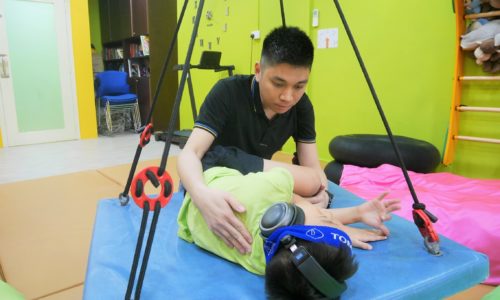Singapore Brain Development Centre
Our Location
1 GOLDHILL PLAZA #01-11 S(308899)
LISTENING THERAPY

Why Listening?
Our ears serve as a vital gateway to the brain, playing a crucial role in receiving and processing sounds. They enable us to identify and analyse different sounds, determine their volume, and assist in coordination, balance, and rhythm. However, any disruptions in the communication between the ears and the brain can have a negative impact on learning, communication, and information processing abilities.
The Difference Between Listening and Hearing
Some children can hear but have trouble listening. A child who listens is one that hears the voice, filters out background noise, breaks down the sentences and understands the meaning.
Listening is a critical skill that children acquire over time. It is one of the building blocks for language and communication. As children get older, they become more attentive and can listen for a lot longer than they once did. Therefore, time allocated for learning increases as a child’s listening skills improve.
In the early years of education, a significant portion of learning is verbal, making strong listening skills essential.
How to Identify Listening Challenges in a Child
Parents may easily notice if their child has difficulty hearing, but they may not be aware when their child faces challenges with listening. This is because a child who doesn’t listen is often perceived as inattentive or stubborn. It is important for parents to recognise the signs as potential indicators of an underlying problem. Some visible symptoms of listening deficiencies in a child may include:
- Trouble following spoken directions, primarily those with multiple steps
- Struggles to remember what he just heard or read
- Easy distraction, mainly from background noise, or sudden loud sounds
- Trouble reading and spelling. The child may also have trouble understanding sounds
- Trouble working on math problems
- Struggles to follow conversations
- Has a difficult time learning nursery rhymes or songs in general
- Asks you to repeat what you have said multiple times
Our Listening Program


We use Singapore Brain Development Centre (SBDC) is proud to be a licensed provider of The Tomatis® Method – the gold medal award winner for scientific research in Europe, as a natural approach to auditory stimulation. It targets the auditory system to stimulate the brain and energises the body – improving your child’s fundamental ability to process information and learn. It has been validated by more than 80 research papers, as well as by clinical and scientific studies. It is a versatile method that has seen many areas of applications. Integrating the Tomatis® Method in our listening therapy has helped with:
Attention Deficits
Designed to assist individuals with a short attention span in improving their ability to maintain focus. This therapy helps the brain recognize and disregard irrelevant distractions, leading to an extended attention span. It can be beneficial for children who struggle with learning due to easy distractibility.
Learning Difficulties
Supports children who have difficulties absorbing new information, leading to enhanced academic skills. Certain children may be labelled as slow learners due to their prolonged information absorption rather than processing speed. The therapy identifies the specific challenge and provides targeted interventions to improve the child’s ability to absorb information effectively, addressing the root cause of their learning difficulties.
Autism Spectrum Disorder
Offers support for children on the autism spectrum who face delays in cognitive development, communication difficulties, and challenges in social integration. By focusing on listening skills, the program helps these children improve their ability to process information and respond effectively, thereby enhancing their communication skills. The program aims to address the unique needs of children with autism and support their overall development in these areas.
Weak Motor Skills and Coordination
Help improve coordination, balance, and motor responses. By targeting the auditory system, this therapy contributes to enhancing the individual’s overall motor skills and physical abilities.
Difficulties in Language and Communication
Plays a crucial role in helping children develop a vital auditory feedback loop, which is essential for effective communication and language acquisition.
Emotional Regulation Problems
Stimulates the emotional system, leading to improved memory retention, emotional control, and learning outcomes.
Integrated Music Therapy
Our Integrated Music Therapy is a versatile and impactful approach that enhances various pedagogical and therapeutic interventions. Suitable for individuals of all ages, from toddlers to adults, it offers comprehensive support and can address a range of learning difficulties. By incorporating music into the therapeutic process, this therapy provides a unique avenue for expression, communication, and growth. It synergistically complements other interventions, amplifying their effectiveness and promoting positive outcomes. Read more about the ways parents can support a Therapeutic Listening Program here.

SCHEDULE A COMPLIMENTARY CONSULTATION
Parent & Children Testimonials
“I’d really like to share my review about SBDC with fellow parents. I went through several therapy sessions for my daughter, but when I first approached SBDC I was impressed with the way the therapist conducted the assessment and came out with the intervention plan which is most accurate and beneficial for my child. Tomatis Listening Therapy is good and effective. I can see a lot of improvements in my daughter. It also enhanced her living and social skills. Therapists are friendly and patient when handling my daughter. Also, I want to give thanks to senior consultant Ms Shiva who has shown her professional approach in clarifying all our queries.”
“Music therapy is good and effective. I can see many improvements in my daughter. Therapists are very friendly and patient while handing my daughter.”
Empower your child to achieve more through Listening therapy!
Discover the impact of Listening Therapy on your child’s learning and cognitive development. Take the first step by contacting us to schedule an appointment, where we can get to know you and provide insights into your child’s unique needs.
